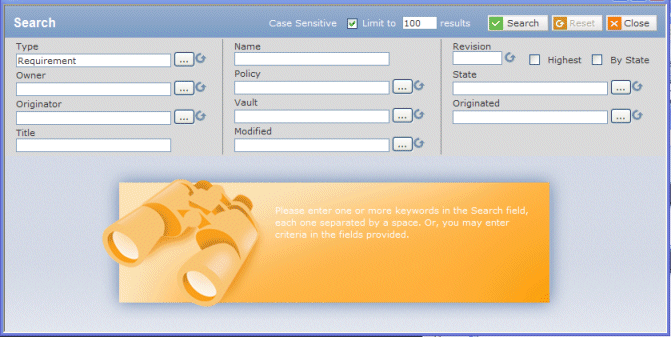Running a Search | ||
| ||
From the global toolbar, click Search > Requirements. Then select the type of object to search for, such as Requirements, Requirement Specifications, or Use Cases.
Or
Click
 next to the field in the page where you need to search for objects.
next to the field in the page where you need to search for objects.Or
From the page Actions menu or page toolbar, click Add Existing if you are adding an existing object to the a list of objects.

Enter criteria as needed. You can use wildcards and enter multiple values (separated by commas or line breaks) in any text field. Depending on your installation setup, you may see additional or fewer fields:
Type. Click
 to change the type shown
in the text box. If you change the type, the values available for the
Policy field are updated to list only those policies that support the
selected type.
to change the type shown
in the text box. If you change the type, the values available for the
Policy field are updated to list only those policies that support the
selected type.Name. The name of the object. You can use leading characters.
Revision. The revision of the object. You can check Highest or By State.
Owner. Click
 to specify the name
of the person who owns the object.
to specify the name
of the person who owns the object.Policy. Click
 to specify the policy of the object.
to specify the policy of the object.State. Click
 to specify the state of the object.
to specify the state of the object.Originator. Click
 to specify the name
of the person who created to object.
to specify the name
of the person who created to object.Vault. Click
 to specify the vault
in which to search.
to specify the vault
in which to search.Originated. Click
 to specify the date on which the object was created.
to specify the date on which the object was created.Title. Enter the title of the object, which can be different from the name.
Modified. Click
 to specify the date on which the object was last modified
to specify the date on which the object was last modifiedClick Search.
The bottom of the page displays the results that meet your criteria. For each object that matches the search criteria, the results list these details:
Name. The name of the object. Click the name to view the Properties page for the object.
Revision. The revision level.
Type. The object type.
Title. The descriptive identifier of the object.
State. The current lifecycle state for the object.
Priority. How important the object is: low, medium, or high priority.
Difficulty. How difficult the object would be to implement: low, medium, or high.
Classification. The general category of the object.
Customer. The customer for whom the object will be implemented.
Owner. The name of the person who owns the object
Parent Specifications. The specification associated with the object.
Click
 to view the Properties page for the object in a separate window.
to view the Properties page for the object in a separate window.To save the search criteria:
-
Click
 > Save As.
> Save As.
- Enter a name for the search, or select an existing search to overwrite it.
- Click Done.
-
Click
To re-execute a saved search, click
 and click the name of the search.
and click the name of the search.
To add selected items to a collection, click Collections, and then click:
- Add to Clipboard Collection. This adds the items to your clipboard collection.
- New / Add to Collections. This opens the Select Collection form.
To clear all criteria fields, click Reset. To clear a single field, click
 (Reset) next to the field.
(Reset) next to the field.